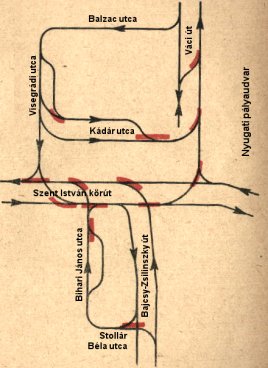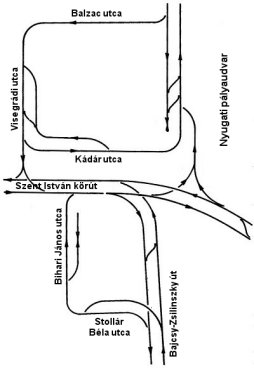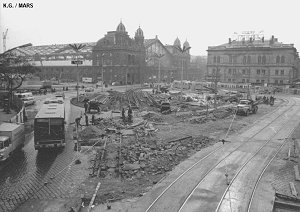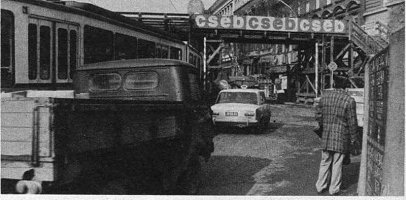budapest
other hungarian
close-up
lost rails
other countries
-
Nyugati
station and the trams around it II.
After the awful destruction done by the second world war, routes were reorganized again. This time efficiency came before everything: long services were launched to accomodate working shifts in the factories. Also, until the bridges (especially Margit híd) were rebuilt, the Grand Boulevard lines were re-routed to Kossuth tér, where the provisional Kossuth híd was the only link to the other side of the river from the northern part of the city for a long time. The Jókai utca turning loop was abandoned, and because the Kádár utca-Visegrádi utca-Szent István körút loop was hindering traffic on the Grand Boulevard, they built a new one on the Balzac utca-Visegrádi utca-Kádár utca route in 1950 - this made it possible to turn back trams to Váci út without coming out to the boulevard.
The map on the left shows the track layout from 1952. As you can see, the tracks in Visegrádi utca are still connected to the boulevard, but this side-track was only used for depot and freight rides. There was also a stub track left on Váci út coming up almost to Kádár utca, it was the terminus for services operated with bidirectional cars or twin sets - like route 62 (Nyugati station - via Váci út - Lehel tér - via Lehel utca - via Béke utca - via Pozsonyi utca - via István út - Szilágyi utca) or 33 (Nyugati station - via Váci út - via Árpád híd - Óbuda). The map on the right shows the track layout in 1972. As you can see, the Stollár Béla utca-Bihari János utca loop was truncated a bit.
The terminal of the Small Boulevard lines
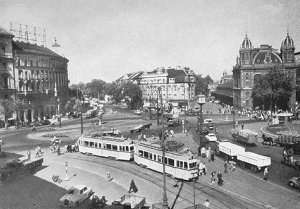
Nyugati tér (then called
Marx square) in the late 1950's
The Bihari János utca-Stollár Béla utca loop was used by the unidirectional motor+trailer+trailer-style service route 49 (Nyugati station - Kelenföld station), while route 48 (Nyugati station - Albertfalva kitérő) and 53 (Nyugati station - Nagyvárad tér) - operated with two-axle twin sets - used the tracks bending to Szent István körút as a stub terminus. When UV cars became available in great numbers, line 48 and 53 was converted for the use of coupled UV sets, from which you can see one on the picture above.
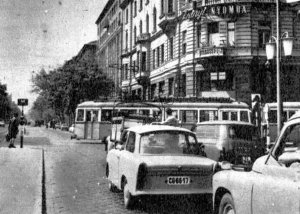
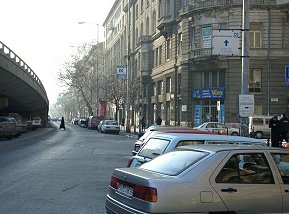
To the left: three-piece
UV set turning into Stollár Béla utca from Bajcsy-Zsilinszky út
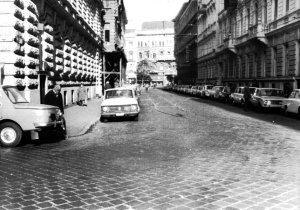
The corner of Stollár Béla
utca and Bihari János utca with the remnants of the two-track terminus
of route 49
Then from 1960 on line 49 was operated with three-piece UV sets (motorcar+trailer+motorcar) which were bidirectional, but too long to stop in the middle of the square. Instead they still entered the loop, let passengers alight and board in Bihari János utca, and then came back to Bajcsy-Zsilinszky út through the same route as they came in. Around this time route 48 was stopped, and route 47 was started between Budafok forgalmi telep and Nyugati station, again with coupled UV sets, just like route 52, which replaced route 53 here (with the route beeing Kispest, Villanytelep - via Üllői út - Kálvin tér - Deák tér - Nyugati station). The remnants of the Stollár Béla utca-Bihari János utca turning loop became UV territory...
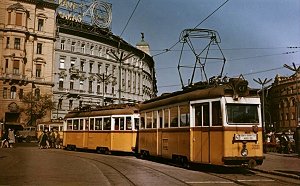
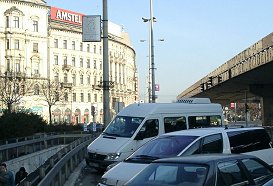
Coupled UV set on route
47 at its terminus in the bend
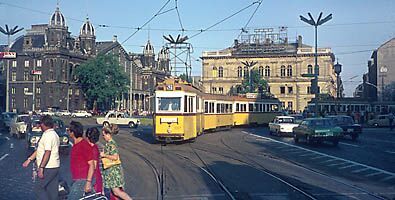
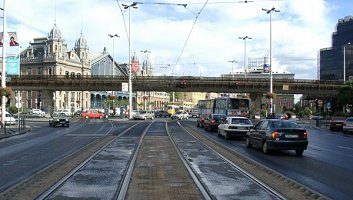
The same bend from the other
direction. The tram coming towards us is a depot ride.
The two-track connection between Szent István körút and Bajcsy-Zsilinszky út was still intact, but it was only used for special or depot rides.
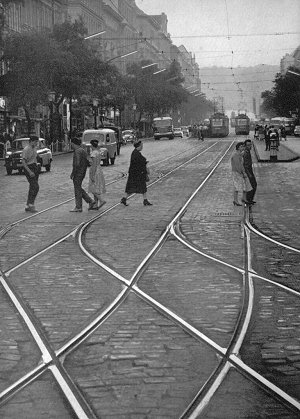
Looking towards Margit híd.
To the left: Bajcsy-Zsilinszky út, to the right: forward on the boulevard
What might seem strange is that the most frequently used direction, namely the one the Grand Boulevard services were using was the diverging direction, and the Szent István körút - Bajcsy-Zsilinszky út path was straight! You can see this on the picture above: the photographer was facing west, looking towards Szent István körút and Margit híd. The tracks diverging to the right-hand side were used by route 4 and 6, while the tracks heading straight for the left-hand side bend over to Bajcsy-Zsilinszky út. You can also spot the tram stop at Visegrádi utca, which doesn't exist today.
The terminus in the remnants of this turning loop was abandoned in a few steps. First they closed the Stollár Béla utca-Bihari János utca section, and built longer boarding platforms to suit three-piece UV sets on both route 47 and 49. Then route 52 was cut back to Nagyvárad tér in 1977, so it dissappeared from here. At the same time construction works for the underground station have started, so they moved the terminus of lines 47 and 49 a bit further on Bajcsy-Zsilinszky út, to Alkotmány utca. Then, in 1980 these routes were cut back to Deák tér. With this, tram traffic on Bajcsy-Zsilinszky út was abandoned. There's a parking lot and an overpass now where the terminus used to be. Strangely enough, tracks in Bihari János utca were left in the pavement until the mid-nineties.
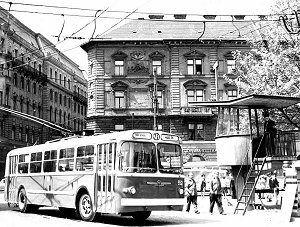
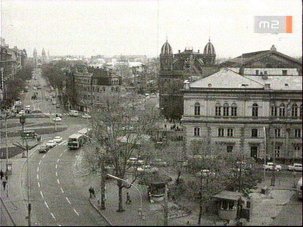
Trolley bus of type Ziu-5
at the terminus and the trolley station seen from above
Of course Nyugati tér was no regular rectangle, so there's no "middle" in the geometrical sense. There weren't any big empty spaces around here until 1978-80, when a few buildings were demolished, but there was enough room just to house a trolleybus terminal at where now the Skála-Metró shopping center is. You can see this on the picture to the left above. If you look close enough, you can also make out a tram in the background, too, that's the terminus of the Small Boulevard routes! The other picture (a capture from the TV-programme "A HÉT" from 1977, re-broadcasted in 2002) shows this section of the square from the roof of one of the houses. On the left rim you can make out the refuge of the terminus of tram routes 47 and 49. In the middle of the background you can see the Westend House (demolished in 1980) and the railway station hiding behind a building that was also torn down later (this was the one around which the old loop of the Grand Boulevard routes ran (loop number 3 on this map)). In the lower right-hand corner you can see the trolleybus terminus.
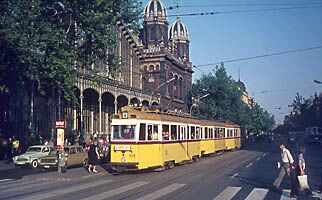
A three-piece UV set in
front of the station
As for the Grand Boulevard services: they had their stops elsewhere than now. Trams heading for Buda stopped right in front of the station, although a little closer, because the street was narrow. Trams heading for the other direction stopped just before Podmaniczky utca. Now they have a joint tram stop in front of the station. A direct connection to the tracks on Váci út was also there in the middle of the traffic circle for the vehicular traffic.
After the construction works for the underground railway, the pedestrian underpass and the flyover bridge started in 1977, the place saw big changes: for example trams on the Grand Boulevard lines were detoured on temporary tracks running at the verge of the square (see picture on the left-hand side above: the original tracks were still there to see at this point). Also, a provisional pedestrian overpass was built (out of wood - see picture to the right) to reduce the possibilities of accidents (pedestrians were crossing the road constantly between the terminal of the Újpest, Rákospalota and Óbuda (3, 12, 14, 33, 55)) and the Small Boulevard lines (47, 49) in a hazardous manner.
The terminal of the Újpest, Rákospalota and Óbuda lines
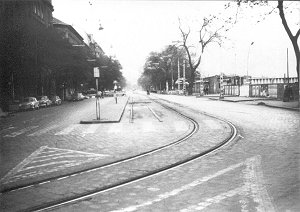
The bend from Kádár utca
to Váci út. You can also see the stub track we saw on maps before.
The giant loop for the Újpest, Rákospalota and Óbuda lines in Balzac utca-Visegrádi utca-Kádár utca deserve a separate page because of the many services and car types found here. It had massive traffic! Until I have enough spare time to translate that material to english, let's just say that this was one of the most exciting tram-spotting places! The loop existed until 1981, but it has been re-routed two times by then, so trams have roamed around almost every street of those few blocks.
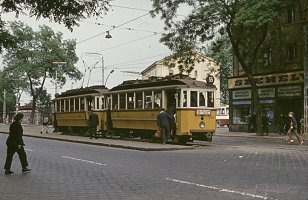
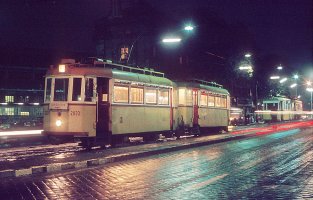
To the left: 1700-series
twin, to the right: 2000-series twin, both at the stub terminus in the
middle of Váci út.
But there was also a stub terminus there in the middle of Váci út just before Kádár utca! While the loop was used (mostly) by unidirectional trams (unidirectional Benghazis, motor+trailer and motor+trailer+trailer sets), this stub track was used by bidirectional ones (twin sets like those on the pictures above, or 3600-series single cars). Normally route 33 was the one terminating here, but there were also other setups, like route 55 featuring twins (and 33 sporting unidirectional motor+trailer+trailer sets turning back in the loop).
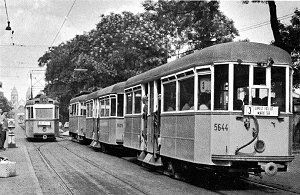
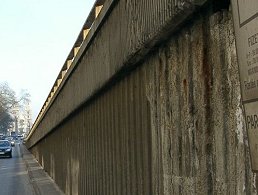
Now there's a flyover bridge
where the tracks and the stub terminus once were...
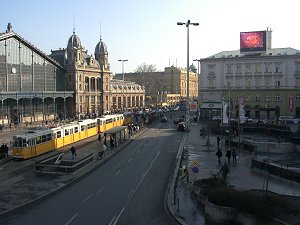
The tram stop of routes
4 and 6 in front of the station. The empty space to the right is not really
a pleasent sight...
The dusk of the tram paradies around Nyugati station was complete in 1981. Since then only the two Grand Boulevard services (line 4 and 6) are crossing the square. Both the Rákospalota and the Small Boulevard tram routes were replaced by the subway. Or is really so? One can still hear people complaining about Bajcsy-Zsilinszky út becoming an "urban motorway" with eight lanes, but without heart and soul. It also proved that cutting back route 14 at Lehel tér was a very bad idea: people alighting the tram at Lehel tér must take the underground for one lousy stop just to reach the Grand Boulevard, which is rather frustrating!
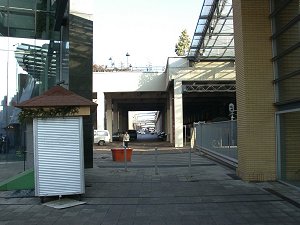
Lost rails that never existed:
the proposed location for the tracks of route 14 at the northern end of
Nyugati tér.
You have to understand that there are plans to re-extend route 14 to Nyugati station, but unfortunately municipal authorities have failed to make this happen. Even the space for the tracks was forseen during the design of Westend City Center, which was built in 1999! As you can see on the picture above, the tram corridor is there, but the location of the proposed terminus is still used as a parking lot. And that's not all: local authorities vetoed this projection: they want to have the tracks between Lehel tér and Nyugati station elsewhere: in the middle of Váci út. Will we see trams on Váci út again?
We'll find out, but don't hold your breath onto it!
And: Tim Boric, Harald Schachenhofer, Heinz Heider, Hans Lehnart
Current photos: Varga Ákos Endre, unless stated differently
Back to the top Back to the main page
